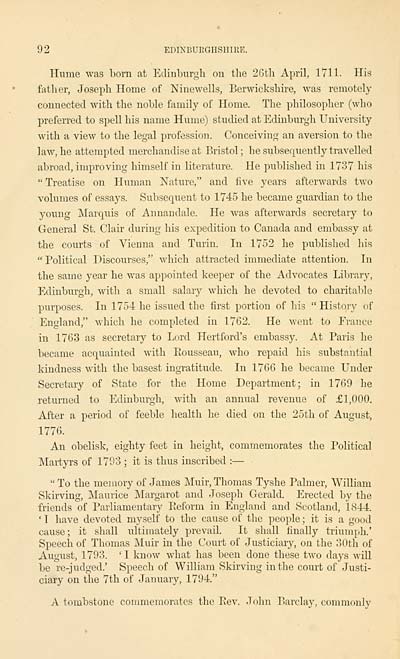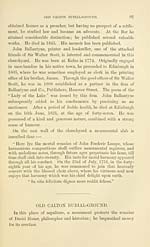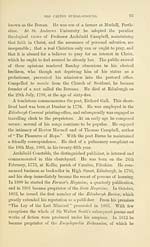Grampian Club > Monuments and monumental inscriptions in Scotland > Volume 1
(116) Page 92
Download files
Complete book:
Individual page:
Thumbnail gallery: Grid view | List view

92 EDINBURGHSHIRE.
Hume was bom at Edinburgh on the 26tli April, 1711. His
father, Joseph Home of Ninewells, Berwickshire, was remotely
connected with the noble family of Home. The philosopher (who
preferred to spell his name Hume) studied at Edinburgh University
with a view to the legal profession. Conceiving an aversion to the
law, he attempted merchandise at Bristol; he subsequently travelled
abroad, improving himself in literature. He published in 1737 his
"Treatise on Human Nature," and five years afterwards two
volumes of essays. Subsequent to 1745 he became guardian to the
young Marquis of Annaudale. He was afterwards secretary to
General St. Clair during his expedition to Canada and embassy at
the courts of Vienna and Turin. In 1752 he published his
"Political Discourses," which attracted immediate attention. In
the same year he was appointed keeper of the Advocates Library,
Edinburgh, with a small salary which he devoted to charitable
purposes. In 1754 he issued the first portion of his " History of
England," which he completed in 1762. He went to France
in 1763 as secretary to Lord Hertford's embassy. At Paris he
became acquainted with Kousseau, who repaid his substantial
kindness with the basest ingratitude. In 1766 he became Under
Secretary of State for the Home Department; in 1769 he
returned to Edinburgh, with an annual revenue of £1,000.
After a period of feeble health he died on the 25th of August,
1776.
An obelisk, eighty feet in height, commemorates the Political
Martyrs of 1793 ; it is thus inscribed : —
" To the memory of James Muir, Thomas Tyshe Palmer, William
Skirving, Maurice Margaret and Joseph Gerald. Erected by the
friends of Parliamentary Ptcform in England and Scotland, 1844.
' I have devoted myself to the cause of the people ; it is a good
cause; it shall ultimately prevail. It shaU finally triumph.'
Speech of Thomas Muir in the Court of Justiciary, on the 30th of
August, 1793. ' I know what has been done these two days will
be re-judged.' Speech of William Skirving in the court of Justi-
ciary on the 7th of January, 1794."
A tombstone commemorates the Eev. John Barclay, commonly
Hume was bom at Edinburgh on the 26tli April, 1711. His
father, Joseph Home of Ninewells, Berwickshire, was remotely
connected with the noble family of Home. The philosopher (who
preferred to spell his name Hume) studied at Edinburgh University
with a view to the legal profession. Conceiving an aversion to the
law, he attempted merchandise at Bristol; he subsequently travelled
abroad, improving himself in literature. He published in 1737 his
"Treatise on Human Nature," and five years afterwards two
volumes of essays. Subsequent to 1745 he became guardian to the
young Marquis of Annaudale. He was afterwards secretary to
General St. Clair during his expedition to Canada and embassy at
the courts of Vienna and Turin. In 1752 he published his
"Political Discourses," which attracted immediate attention. In
the same year he was appointed keeper of the Advocates Library,
Edinburgh, with a small salary which he devoted to charitable
purposes. In 1754 he issued the first portion of his " History of
England," which he completed in 1762. He went to France
in 1763 as secretary to Lord Hertford's embassy. At Paris he
became acquainted with Kousseau, who repaid his substantial
kindness with the basest ingratitude. In 1766 he became Under
Secretary of State for the Home Department; in 1769 he
returned to Edinburgh, with an annual revenue of £1,000.
After a period of feeble health he died on the 25th of August,
1776.
An obelisk, eighty feet in height, commemorates the Political
Martyrs of 1793 ; it is thus inscribed : —
" To the memory of James Muir, Thomas Tyshe Palmer, William
Skirving, Maurice Margaret and Joseph Gerald. Erected by the
friends of Parliamentary Ptcform in England and Scotland, 1844.
' I have devoted myself to the cause of the people ; it is a good
cause; it shall ultimately prevail. It shaU finally triumph.'
Speech of Thomas Muir in the Court of Justiciary, on the 30th of
August, 1793. ' I know what has been done these two days will
be re-judged.' Speech of William Skirving in the court of Justi-
ciary on the 7th of January, 1794."
A tombstone commemorates the Eev. John Barclay, commonly
Set display mode to: Large image | Transcription
Images and transcriptions on this page, including medium image downloads, may be used under the Creative Commons Attribution 4.0 International Licence unless otherwise stated. ![]()
| Publications by Scottish clubs > Grampian Club > Monuments and monumental inscriptions in Scotland > Volume 1 > (116) Page 92 |
|---|
| Permanent URL | https://digital.nls.uk/80691821 |
|---|
| Description | Vol. I. |
|---|---|
| Attribution and copyright: |
|
| Description | Note: Numbers 24-41 are relative to but not part of the Club's series. |
|---|---|

